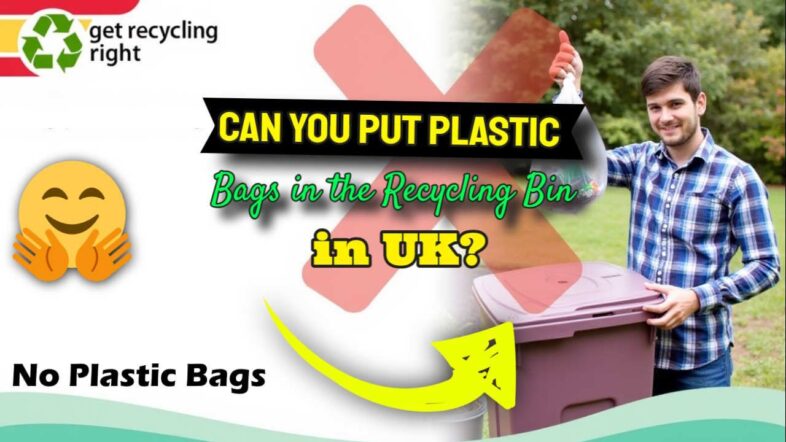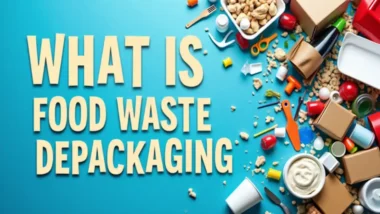No, you must not put plastic bags into your home recycling bin in the UK. Until new machinery is installed at all recycling centres, they will clog sorting machinery, and most local councils and many supermarkets do not accept them. Instead, plastic bags should be reused or recycled at dedicated collection points at supermarkets and other retailers. Always check with your local authority for specific guidance on what they accept.
Key Takeaways Answering the Question: Can you put plastic bags in recycling bin UK?
- Plastic bags should not be placed in household recycling bins in the UK (in 2025), as they jam sorting machinery at recycling facilities
- Most major UK supermarkets provide dedicated collection points specifically for plastic bag recycling
- A wide variety of plastic films can be recycled, including carrier bags, bread bags, and cereal box liners, when clean and properly sorted
- Biodegradable and compostable plastic bags require special processing and should never be placed in regular recycling
- RecycleNow offers a convenient postcode checker to find your nearest plastic bag recycling point
Want to know if those pesky plastic bags can go in your recycling bin? The short answer is no – but there's more to the story than a simple rejection.
If you've been tossing plastic carrier bags into your household recycling bin, you might be doing more harm than good. Despite good intentions, this common practice creates significant problems for UK recycling facilities and can actually prevent other materials from being properly recycled. Let me guide you through the proper way to recycle plastic bags in the UK and explain why following these guidelines matters.
The Truth About Plastic Bags in UK Recycling Bins
The rules around plastic bag recycling in the UK can be confusing, especially with different councils having varying policies. However, one consistent rule applies nationwide: regular household recycling bins are not designed to handle plastic bags and film. Even if your local authority collects other plastics like bottles and containers, plastic bags require special processing.
The confusion partly stems from seeing recycling symbols on plastic bags, leading many to assume they can go in with other recyclables. While these bags are technically recyclable as a material, they need to follow a different recycling journey than your bottles and containers.
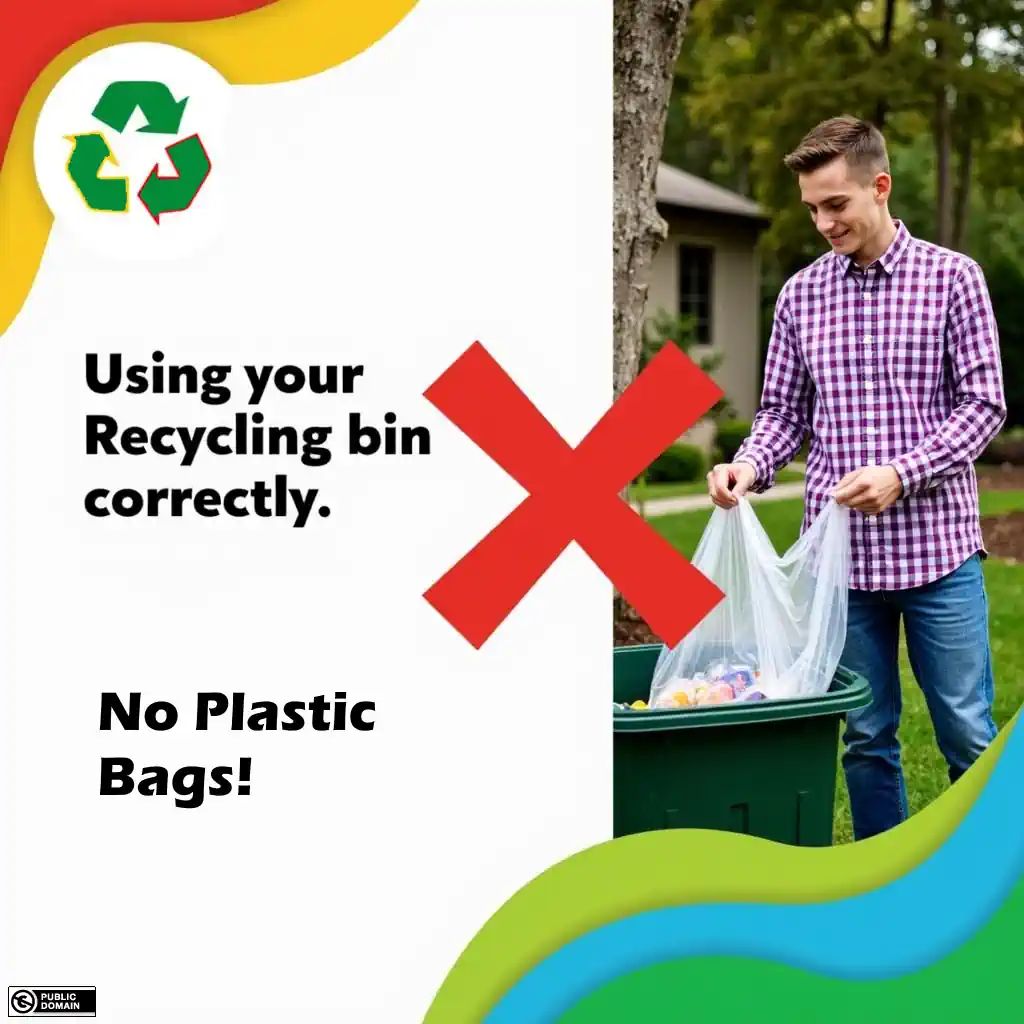
No, Plastic Bags Don't Belong in Your Home Recycling Bin
Placing plastic bags in your household recycling bin creates multiple problems at sorting facilities. When bags enter the mechanical sorting system, they quickly become entangled in the rotating machinery designed to separate different materials. This entanglement forces operators to shut down the entire system frequently to manually cut away the wrapped plastic, wasting valuable time and resources.
Why Plastic Bags Cause Problems at Recycling Facilities
- They wrap around sorting equipment, jamming machinery and causing breakdowns
- They contaminate other recyclable materials, reducing quality and value
- They often contain food residue and moisture, which damages paper recycling
- They're difficult to detect and separate from other materials
- The thin film material requires specialized processing equipment not available at standard recycling facilities
The technical term for this problem is “wishcycling” – putting items in recycling bins hoping they'll be recycled when they actually can't be processed. In 2018, this problem became even more acute after China stopped accepting certain types of plastic waste from the UK, making proper sorting more critical than ever for the economics of recycling. For more insights into recycling issues, check out this article on circular solutions for waste recycling.
Beyond the machinery problems, plastic bags in mixed recycling significantly reduce the value and quality of recycled materials. When plastic films mix with paper, for example, they contaminate the paper stream and reduce its recyclability. A single plastic bag can contaminate an entire batch of otherwise recyclable materials.
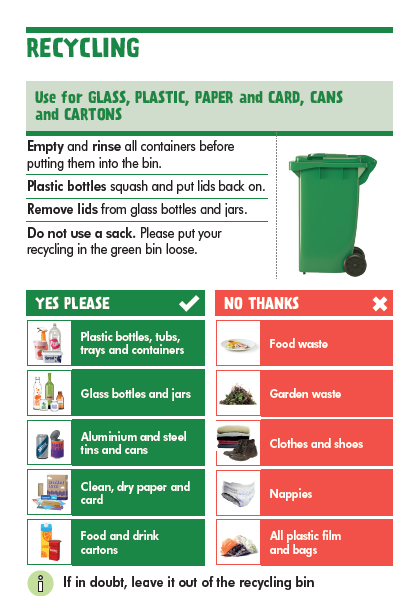
“What can and can't be recycled | London …” from www.lbhf.gov.uk and used with no modifications.
What Happens When You Put Plastic Bags in Your Recycling Bin
When plastic bags incorrectly enter the recycling stream, they typically follow one of three paths – none of which involve actually being recycled. Most commonly, they're separated during sorting and sent to landfill or incineration. In some cases, they remain mixed with other recyclables, contaminating entire batches and potentially causing those materials to be rejected as well.
In the worst-case scenario, undetected plastic bags make it through the sorting process and damage recycling equipment, leading to costly repairs and downtime. This significantly increases the cost of recycling operations and ultimately impacts council budgets that could be used for other environmental initiatives.

Where You Should Recycle Plastic Bags Instead
The good news is that plastic bags are recyclable – just not in your household bin. The UK has developed dedicated collection systems specifically for plastic bags and films that ensure they enter the proper recycling stream. These dedicated streams allow the material to be properly sorted, cleaned, and processed into new products without contaminating other recyclables.
Supermarket Collection Points: The Best Option
The most accessible option for recycling plastic bags in the UK is through supermarket collection points. Most major supermarkets have established front-of-store recycling bins specifically designed for plastic bags and film. These collection points are typically located near the entrance or checkout areas, making it convenient to drop off your plastic bags during your regular shopping trips.
What makes these collection points so effective is that they create a clean, segregated stream of plastic film that doesn't contaminate other recyclables. The collected material goes directly to specialized recycling facilities equipped to handle this specific type of plastic. This targeted approach results in much higher recycling rates for plastic bags compared to mixed recycling systems.
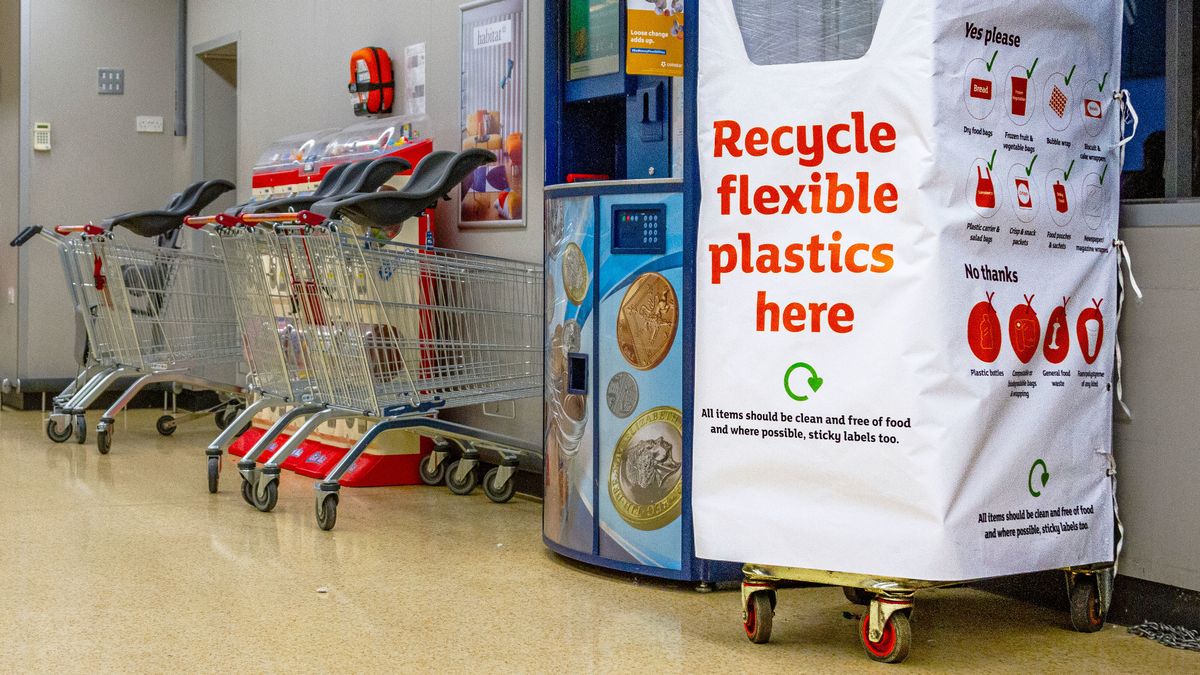
“supermarket recycling schemes …” from www.walesonline.co.uk and used with no modifications.
Which Major UK Supermarkets Accept Plastic Bags
Nearly all major UK supermarket chains now offer plastic bag recycling services, though availability may vary by location. Tesco, Sainsbury's, Morrisons, Waitrose, Co-op, and Asda all operate plastic bag collection schemes in most of their stores. Many of these retailers have expanded their collection to include not just carrier bags but a wide range of plastic films and wrappings that can't go in household recycling.
Many of these supermarkets have partnered with specialized recycling companies to ensure the collected plastic films are properly processed. For example, some work with the recycling company Veolia to transform the collected bags into new products, including – ironically enough – new carrier bags, completing a true closed-loop recycling system.
“Front of store recycling points at major supermarkets now accept all types of plastic bags and wrapping. This is the main route for recycling these materials in the UK until kerbside collection of plastic bags and wrapping is more widely available.” – RecycleNow, UK's national recycling campaign
Types of Plastic Bags and Wrapping You Can Recycle
Supermarket collection points accept a surprisingly wide variety of plastic films beyond just carrier bags. Understanding what can be included helps ensure more plastic stays out of landfills. Most collection points clearly list accepted materials, but the following items are generally recyclable at these locations:
- Plastic shopping bags and carrier bags
- Bread bags and other food bags (thoroughly cleaned)
- Cereal box liners and other food packaging films
- Toilet and kitchen roll wrapping
- Plastic magazine and newspaper wrappers
- Bubble wrap and plastic shipping envelopes (with paper labels removed)
- Plastic films marked with recycling code #2 (HDPE) or #4 (LDPE)
- Frozen food bags (once thawed and cleaned)
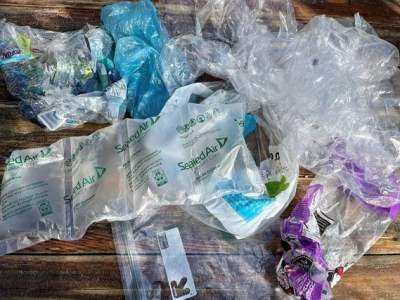
“plastic film and bag recycling …” from www.capitolhillseattle.com and used with no modifications to explain why the answer to “Can you put plastic bags in recycling bin UK” is, no.
How to Prepare Plastic Bags for Recycling
Proper preparation of your plastic bags is essential for successful recycling. Contaminants like food residue, paper labels, or dirt can render the material unrecyclable or damage the quality of the recycled output. Taking a few simple steps before dropping off your bags ensures they can be effectively processed into new products rather than being rejected and sent to landfill.
Empty and Clean All Bags
All plastic bags and wrapping must be clean and free from food residue before recycling. Even small amounts of contamination can affect an entire batch of recycled plastic, potentially causing it to be rejected. For food packaging like bread bags or frozen vegetable bags, turn them inside out if necessary and give them a quick rinse to remove crumbs or residue.
After washing, make sure bags are completely dry before collection, as moisture can lead to mold growth or degradation during storage and transport. A simple method is to hang washed bags on your dish rack or washing line until completely dry, then store them together until your next supermarket visit.
Remove Labels and Non-Plastic Parts
Many plastic bags come with paper labels, adhesive stickers, or other non-plastic components that need to be removed before recycling. These include price tags on bread bags, paper address labels on shipping envelopes, and sticky tape on packaging films. While it might seem like a small detail, waste separation methods can help prevent these mixed materials from contaminating the recycling process and reducing the quality of the recycled output.
Sorting Different Types of Plastic Films
While most supermarket collection points accept all types of clean plastic film together, being familiar with the different types can help you understand which items are recyclable. Look for the resin identification code – the number inside the recycling symbol – which indicates the type of plastic. Most carrier bags and plastic films are made from Low-Density Polyethylene (LDPE, code #4) or High-Density Polyethylene (HDPE, code #2), both of which are readily recyclable through dedicated collection systems.
What About Biodegradable and Compostable Bags?
Biodegradable and compostable plastic bags present a special challenge for recycling systems. Despite sounding eco-friendly, these materials should never be placed in plastic bag recycling bins at supermarkets. They're designed to break down under specific conditions and can contaminate conventional plastic recycling streams. If these materials mix with regular plastic, they can compromise the structural integrity of the recycled output, making it unsuitable for manufacturing new products.
The Journey of a Recycled Plastic Bag
Once collected from supermarket recycling points, plastic bags embark on a fascinating journey of transformation. The process begins with sorting by material type and colour, ensuring that only compatible plastics are processed together. After sorting, the bags are thoroughly cleaned and shredded into small flakes, which are then melted down and formed into pellets – the basic building blocks for new plastic products.
These recycled pellets can be used to manufacture a wide range of products – from new plastic bags and bin liners to outdoor furniture, playground equipment, and even construction materials. One kilogram of recycled plastic saves approximately 1.5 kg of carbon dioxide compared to using virgin plastic, making this process not just waste reduction but genuine carbon mitigation.
Collection and Sorting Process
After being deposited at supermarket collection points, plastic bags are transported to specialised recycling facilities that handle flexible plastics. Unlike rigid plastics, which can be automatically sorted, plastic films require more manual intervention and specialised depackaging equipment. The bags are first sorted to remove non-recyclable contaminants, then separated by polymer type using optical sorting technology that identifies the specific plastic composition.
This sorting stage is crucial because different types of plastic film have different melting points and chemical properties. Mixing incompatible plastics would result in a lower-quality recycled material with limited applications. The precision of this sorting explains why dedicated collection streams are so important for successful plastic film recycling.
Transformation into New Products
After sorting and cleaning, the plastic film undergoes several processing stages. It's shredded into small pieces, washed again to remove any remaining contaminants, then dried and melted down. The molten plastic is filtered to remove impurities before being formed into pellets. These recycled plastic pellets become the raw material for manufacturing new products, completing the circular economy loop.
In the UK, recycled plastic film is increasingly being used in the production of new carrier bags – creating a true closed-loop system where today's shopping bag becomes tomorrow's shopping bag. Other common applications include plastic lumber for outdoor furniture, drainage pipes, bin liners, and even components for automotive manufacturing.
Reducing Your Plastic Bag Use
While recycling is important, reducing consumption should always be the first priority in sustainable waste management. The UK's plastic bag charge, introduced in 2015, has been remarkably successful in this regard, reducing single-use plastic bag consumption by over 95% in major supermarkets. This dramatic reduction demonstrates how effective policy and collective consumer action can drive meaningful environmental change.
Reusable Alternatives to Single-Use Plastic Bags
The most sustainable approach to plastic bag waste is to minimize usage in the first place. Fortunately, there are numerous alternatives that not only reduce waste but often prove more practical and durable than conventional plastic bags. Cotton tote bags, woven shopping baskets, and durable “bags for life” all offer sustainable alternatives with different advantages depending on your shopping habits.
When choosing reusable bags, consider the full lifecycle environmental impact. While cotton bags have a higher initial environmental footprint than plastic, they become the more sustainable choice after multiple uses. Studies suggest a cotton bag needs to be used 131 times to have less environmental impact than single-use plastic bags – a threshold easily reached with regular use over a year or two.
- Sturdy canvas totes – durable and washable, ideal for heavy groceries
- Foldable polyester bags – lightweight and compact, perfect for keeping in purses or glove compartments
- String or mesh bags – excellent for produce shopping and highly packable
- Insulated bags – perfect for keeping frozen or refrigerated items cold
- Woven baskets – stylish, extremely durable, and biodegradable at end-of-life
Many of these reusable options are available from UK retailers like Tesco, Sainsbury's, and Morrisons, who offer affordable “bags for life” that can be exchanged for free when worn out. Some companies even recycle their own bags, creating a closed-loop system where your old bag becomes part of new bags.

How to Remember Your Reusable Bags
The biggest challenge with reusable bags isn't buying them – it's remembering to bring them when shopping. We've all experienced the frustration of arriving at the checkout only to realise our reusable bags are sitting at home or in the car. Establishing simple habits can overcome this common barrier to sustainable shopping.
Try keeping bags in multiple locations – by your front door, in your car, and a compact foldable one in your handbag or backpack. Setting a reminder on your phone before regular shopping trips or adding “bags” to your shopping list can also help form the habit. Some people find that hanging bags on the doorknob after unpacking groceries creates a visual reminder to take them on the next shopping trip.
Why Proper Plastic Recycling Matters for the UK
The UK generates approximately 2.4 million tonnes of plastic packaging waste annually, with plastic films and bags making up a significant portion of this total. When improperly disposed of, this plastic can persist in the environment for hundreds of years, breaking down into harmful microplastics that contaminate soil, water, and eventually enter the food chain.
Beyond environmental benefits, proper plastic recycling creates economic opportunities. The recycling sector in the UK supports over 50,000 jobs and contributes billions to the economy annually. By separating plastic bags for proper recycling, consumers help support this growing green economy while reducing dependence on imported virgin plastics manufactured from fossil fuels.
Following proper recycling guidelines also reduces costs for local councils, which face significant expenses dealing with contaminated recycling streams. When plastic bags jam sorting machinery, the resulting downtime and repairs can cost thousands of pounds – money that ultimately comes from taxpayers. By taking a few extra steps to recycle bags correctly, citizens help ensure public resources are used efficiently.

Frequently Asked Questions
Navigating the complexities of plastic recycling can raise many questions. Here are straightforward answers to some of the most common queries about plastic bag recycling in the UK.
Can I put plastic carrier bags in my food waste bin?
Some local authorities do allow plastic bags to be used as liners for food waste caddies, but these bags are not recycled with the food waste. When the food waste reaches processing facilities, the plastic bags are separated out and typically sent for incineration. The policy varies by council, so check your local authority's guidelines.
This practice often causes confusion because it seems to contradict general recycling guidance. When plastic bags are used in food waste collections, they're functioning purely as containers to keep the caddy clean and make disposal more hygienic. At the anaerobic digestion facilities where food waste is processed, these bags are removed before processing begins.
If your council allows plastic bags in food waste, this doesn't mean they're being recycled – they're simply being separated and typically sent for energy recovery through incineration. For genuine recycling of plastic bags, supermarket collection points remain the best option.
Some councils are now switching to compostable liners for food waste, which can break down during the processing. If your council provides these, they're preferable to conventional plastic bags, though they still shouldn't go in your regular recycling bin.
It's always best to check your specific council's guidelines, as approaches to food waste collection vary significantly across the UK. You can typically find this information on your local council's website or by contacting their waste management department directly.
What should I do with plastic bags if I don't have access to a supermarket recycling point?
If you don't have convenient access to a supermarket collection point, consider storing clean, dry plastic bags until your next visit to a location with recycling facilities. Alternatively, check if your workplace, local community centre, or nearby schools offer collection points. RecycleNow's locator tool (recyclenow.com) can help find collection points beyond supermarkets, including some council recycling centres that accept plastic films separately from household collections.
As a last resort, if recycling is truly not an option, ensure plastic bags go into your general waste bin rather than contaminating your recycling bin. While not ideal, proper disposal in general waste prevents the operational problems caused by plastic bags in recycling machinery. Meanwhile, focus on reducing plastic bag use by switching to reusable alternatives whenever possible.
Are bread bags and cereal box liners recyclable?
Yes, both bread bags and cereal box liners are typically recyclable through supermarket collection points alongside carrier bags. These items are usually made from Low-Density Polyethylene (LDPE, recycling code #4), the same material as many carrier bags.
Just ensure they're clean and free from food residue before recycling – a quick shake to remove crumbs is usually sufficient for cereal liners, while bread bags might need a gentle wipe to remove any remaining breadcrumbs.
How can I tell if a plastic film is recyclable?
The easiest way to identify recyclable plastic film is by looking for the recycling symbol containing a number 2 (HDPE) or 4 (LDPE).
When in doubt, check the packaging for recycling information or consult the RecycleNow website, which maintains up-to-date guidance on specific packaging types.
Why are the rules for plastic bag recycling different across the UK?
Recycling rules vary across the UK due to differences in local recycling infrastructure, contracts with waste management companies, and historical investment decisions. Each local authority contracts its own waste management services, resulting in different capabilities and processes for handling materials.
The UK government is working toward standardising recycling collections through the Resources and Waste Strategy, which aims to make recycling more consistent across the country. This includes plans to introduce consistent collections of plastic films and flexible packaging by March 2027, though the details are still being finalised.
Can You Put Plastic Bags in Recycling Bin UK? – Conclusion
Until national standardisation is implemented, the safest approach for plastic bags remains taking them to supermarket collection points rather than including them in household recycling. This dedicated stream ensures proper processing regardless of local variations in recycling services.
For the most current information about plastic bag recycling in your area, check your local council's website or use the RecycleNow website's postcode checker, which provides tailored recycling information based on your specific location. Additionally, you can explore 10 ways to reduce, reuse, and recycle to enhance your recycling efforts.
By following these guidelines, you're making a meaningful contribution to reducing plastic pollution and supporting the UK's transition to a more circular economy.


